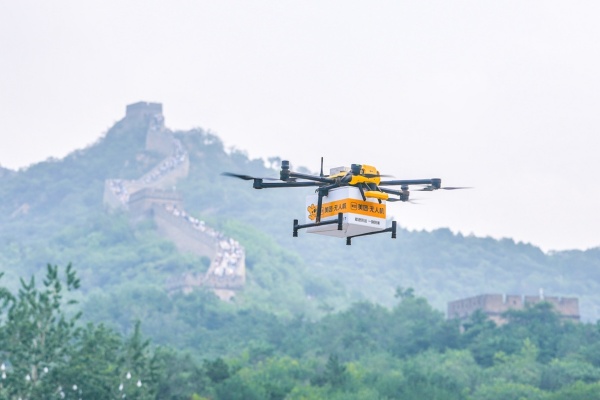
- Home
- Media Center
-
Events
- Wuzhen Summit
- Regional Forums
- Practice Cases of Jointly Building a Community with a Shared Future in Cyberspace
- World Internet Conference Awards for Pioneering Science and Technology
- The Light of Internet Expo
- Straight to Wuzhen Competition
- Global Youth Leadership Program
- WIC Distinguished Contribution Award
- Membership
- Research & Cooperation
- Digital Academy
-
Reports
- Collection of cases on Jointly Building a Community with a Shared Future in Cyberspace
- Collection of Shortlisted Achievements of World Internet Conference Awards for Pioneering Science and Technology
- Reports on Artificial Intelligence
- Reports on Cross—Border E—Commerce
- Reports on Data
- Outcomes of Think Tank Cooperation Program
- Series on Sovereignty in Cyberspace Theory and Practice
- Other Achievements
- About WIC
- 中文 | EN

Drones deliver takeout, emergency kits to Great Wall

A delivery drone heads for the Badaling section of the Great Wall in Beijing on Friday. [Photo for China Daily]
Fancy some steamed buns or sandwiches to beat the hunger pangs when hiking on the Great Wall? Look no further than e-commerce platform Meituan, which is combining an innovative service model with cutting-edge drone technology to make your visit to the iconic landmark more memorable.
Since last week, visitors to the Badaling section of the Great Wall have been able to order food and emergency supplies on the platform, and their orders have been dropped off not by delivery workers on electric bikes, but by unmanned aerial vehicles.
Operating in the South Nine Towers area of Badaling, the service promises delivery by drones within five to 15 minutes. The minimum order amount is 20 yuan ($2.8), with an additional delivery fee of 4 yuan. Currently, multinational fast food chain Subway, Chinese fast food chain Qingfeng Baozipu and one convenience store are participating in the service.
The South Nine Towers area, which opened to the public at the end of last year, is a less commercialized, rugged section of the Great Wall. It preserves the Wall's historical charm while accommodating activities such as hiking and photography. The drone service caters to visitors who previously had to walk nearly 30 minutes to access supplies due to a lack of on-site amenities.
This year's scorching summer in Beijing increased the demand for emergency supplies and cooling products, such as umbrellas, among visitors hiking on the Wall.
Emergency deliveries take about 5 minutes, Meituan said. A drone carrying emergency supplies recently provided relief for one tourist whose blood sugar level dropped, it said. In addition, the drones are assisting the Wall's maintenance staff in collecting trash after the operating hours of the attraction end at 4 pm.
Mao Yinian, vice-president of Meituan and head of its drone operations, said the company is optimistic about expanding the service. "We hope to collaborate with more brands to enhance consumer experience through technology."
The e-commerce platform already operates more than 30 drone routes in several cities, including Beijing, Shanghai, and Shenzhen and Guangzhou in Guangdong province, and has completed more than 300,000 orders. The service covers deliveries to offices, residential neighborhoods, scenic areas and places that need emergency medical supplies.
Li Xiaojin, a professor of aviation economics at Civil Aviation University in Tianjin, hailed the growing convenience and potential of drone delivery services. "For travelers, this service is very convenient," he said.
Drones are particularly suited for making lifesaving deliveries, such as transporting blood for transfusion, and can assist during emergency situations, such as fighting a fire, he said.
The expert, however, outlined the main challenges for low-altitude logistics, noting that safety and economic feasibility are primary concerns. He identified three key areas for future development — enhancing high-end capabilities for users with higher budget flexibility, promoting digital management for safe and efficient operations, and incorporating intelligent systems to optimize flight paths for both speed and safety.
"The low-altitude economy holds significant potential. Almost all ground activities could potentially be moved to the air, with notable advancements in low-altitude transportation, logistics, tourism and emergency services," he said.
Li also highlighted China's advantages in this sector. "The country has a substantial lead in the low-altitude economy. It accounts for about 90 percent of global civilian drone production, and Chinese drones are priced at roughly 5 percent of those in developed nations," he said.
China's low-altitude economy — a strategic emerging industry — is expanding quickly, according to officials from the Civil Aviation Administration of China.
Sun Wensheng, deputy director of the administration's General Office, described the sector as highly innovative and tech-driven, with a complex industry chain and diverse applications.
China's drone sector has seen rapid growth. As of 2023, there were nearly 1.27 million registered drones, up 32.2 percent year-on-year, while the number of companies operating them reached 19,000.
Luo Hongjiang, deputy director of the administration's Air Traffic Control Industry Management Office, said the development of civilian drones is progressing well. "Drones have achieved widespread use in agriculture, forestry, animal husbandry and aerial photography, with emerging management models and technical standards for urban and logistical applications beginning to take shape," he added.

The World Internet Conference (WIC) was established as an international organization on July 12, 2022, headquartered in Beijing, China. It was jointly initiated by Global System for Mobile Communication Association (GSMA), National Computer Network Emergency Response Technical Team/Coordination Center of China (CNCERT), China Internet Network Information Center (CNNIC), Alibaba Group, Tencent, and Zhijiang Lab.





